|
|
|
Sort Order |
|
|
|
Items / Page
|
|
|
|
|
|
|
| Srl | Item |
| 1 |
ID:
137644
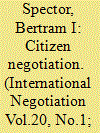

|
|
|
|
|
| Summary/Abstract |
Negotiation is becoming a more inclusive activity. More and different types of actors are taking part at national and international levels to resolve conflicts and seek agreement. At a national level, non-governmental organizations and individual citizens are partaking in mass demonstrations that often evolve into negotiation. At the international level, ngos working through issue networks have been participating more and more in formal negotiations with state parties. By reviewing several cases at these different levels, this article identifies useful questions for future research focusing on the sources of legitimacy and power of these new actors and how they are changing the organization, structure, process and outcomes of negotiation.
|
|
|
|
|
|
|
|
|
|
|
|
|
|
|
|
| 2 |
ID:
137641
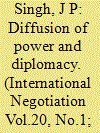

|
|
|
|
|
| Summary/Abstract |
The classic hierarchical distribution of power featuring nation-states is now increasingly supplemented with a diffusion of power with multiple actors. A hierarchical concentration of power is predicated toward bargaining coercion and great powers can impose their solutions on the weak. Diffused power allows for joint problem solving among multiple actors through negotiations but also makes reaching agreement hard because of the relatively greater equality among bargaining units. Reaching agreement in a diffusion of power is also hard because of the new perspectives and meanings that arise through globalized interactions. These new meanings – for example, commerce viewed through the lens of intra-firm rather than inter-country trade – make it hard to fashion solutions based on past understandings centered on territoriality and nation-states
|
|
|
|
|
|
|
|
|
|
|
|
|
|
|
|
| 3 |
ID:
137637


|
|
|
|
|
| Summary/Abstract |
There are a wide range of roles and effects that justice can have in negotiations at the international level. It can be a source of conflict and trigger for negotiation, a referent guiding negotiations, a subject of negotiation, a tool to reach effective agreements, and a tactical tool. Justice can assume any or several of these roles in any one negotiation. This article looks at justice as a lens through which to understand what drives negotiation processes and explains different results in the international arena.
|
|
|
|
|
|
|
|
|
|
|
|
|
|
|
|
| 4 |
ID:
137635
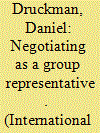

|
|
|
|
|
| Summary/Abstract |
Research on negotiating representatives has been a popular topic since the 1960s. The early experimental studies revealed a variety of situational influences on the decisions made by representatives. Construed as constraints, these variables are shown to move negotiating processes in the direction of agreement or impasse. More recent research extends the portfolio of influences by examining the roles of trust, immoral behavior, group status, and divided constituencies. Of particular interest is the finding that hawkish constituents have more influence on representatives than dovish constituents. The effect is, however, weaker when the hawks have low group status. It is also weakened when representatives are primed to have a pro-social orientation. Another recent line of research focuses on collective representation and shows how several features of constituencies influence those decisions. The article concludes with a summary of key findings and a suggestion for bridging the behavioral and interpretative traditions of scholarship on representation.
|
|
|
|
|
|
|
|
|
|
|
|
|
|
|
|
| 5 |
ID:
137648
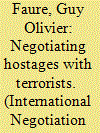

|
|
|
|
|
| Summary/Abstract |
There are few negotiations where it is so necessary to be fast and effective than in those that deal with hostages. This is an almost unfeasible task that has to be carried out with the most unlikely negotiator, the terrorist, in an extremely hostile context. Considering the issues at stake – the freedom of the hostages and, very often, their lives – a negotiator has to manage many challenges. There are seven dilemmas and paradoxes in reaching agreement. A negotiator has to solve a Shakespearian dilemma, manage contradictory objectives, deal with incompatible rationales, handle the toughness dilemma, come to grips with contradictions between empathy and assertiveness, handle cultural dilemmas, and cope with a moral dilemma.
|
|
|
|
|
|
|
|
|
|
|
|
|
|
|
|
| 6 |
ID:
137646
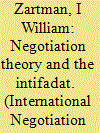

|
|
|
|
|
| Summary/Abstract |
The evolution of the Arab Spring in eight countries is primarily a matter of negotiation. The instances can be broken down into Short Track (Tunisia, Egypt) and Long Track (Syria, Libya, Yemen) Transitions and Short Track (Algeria, Morocco, Bahrain) Reactions. They bring a number of lessons for negotiation analysis, primarily on scope and power, and their deviation from an ideal type model can be explained by the predominance of distributive over integrative negotiation and the imposition of a three-dimensional scene for negotiation and legitimization, with an Islamic dimension overlaying the usual left-right spectrum.
|
|
|
|
|
|
|
|
|
|
|
|
|
|
|
|
| 7 |
ID:
137639
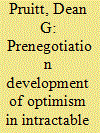

|
|
|
|
|
| Summary/Abstract |
Except when there is substantial third-party pressure for settlement, participants in intractable conflict will only enter negotiation if they are motivated to end the conflict and optimistic about negotiation’s chances of success. The sources of such optimism are explored using case material from three intractable interethnic conflicts that were ultimately resolved by negotiation. In all three cases, optimism developed during prenegotiation communication between the parties. Also there were two main channels of communication, each channel providing credibility to the other and serving as a back-up if the other failed. In two of the cases the communication was face-to-face and friendly, but in the third it was distant and mediated by a chain of two intermediaries. A possible reason for this difference is that the parties were positively interdependent in the first two cases but not in the third. The paper concludes with a summary of three psychological experiments that demonstrate the impact of positive vs. negative interdependence.
|
|
|
|
|
|
|
|
|
|
|
|
|
|
|
|
| 8 |
ID:
137632
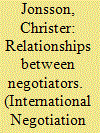

|
|
|
|
|
| Summary/Abstract |
Negotiation can be seen as a dynamic social process. Perspectives emphasizing the social context and dynamics of negotiations have been largely neglected in the negotiation literature. This article addresses the question of why social relations have received such scant attention, reviews the existing literature on negotiation as a social process, and spells out some ingredients of a social contextual approach. Finally, by way of illustration, such an approach is applied to international negotiations. Whereas ideas about social dynamics emanate from a focus on individuals, international negotiations take place at a level of aggregation and representation most remote from the individual level. Yet, even at this macro level, social context matters in negotiations.
|
|
|
|
|
|
|
|
|
|
|
|
|
|
|
|
| 9 |
ID:
137630


|
|
|
|
|
| Summary/Abstract |
In this 20th anniversary issue of International Negotiation, we reflect back on past accomplishments and look forward to new areas of inquiry. The journal has focused on promoting four goals: concentrating research attention on challenging topics through thematic issues, supporting researcher-practitioner dialogue, stimulating interdisciplinary discussion, and providing a platform for new research frameworks and approaches. The articles in this anniversary issue consider the state of the field over the past two decades, highlight critical areas that demand further attention, and offer research agendas to fill those gaps.
|
|
|
|
|
|
|
|
|
|
|
|
|
|
|
|
| 10 |
ID:
137649
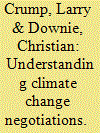

|
|
|
|
|
| Summary/Abstract |
Climate change is the largest and most complicated interdependent issue the world has confronted. Yet there is little negotiation and conflict management knowledge within the climate change context. To address this gap, this theoretical article reviews the sparse extant literature and provides a brief overview of the science of climate change public policy. This review establishes a foundation for examining negotiation and conflict management research questions that emanate from current and future climate change negotiations. Such questions are considered for climate change mitigation negotiations and climate change adaptation negotiations. This article demonstrates how the negotiation and conflict management field can make important contributions to the study of interdependency in a context of climate change.
|
|
|
|
|
|
|
|
|
|
|
|
|
|
|
|
|
|
|
|
|